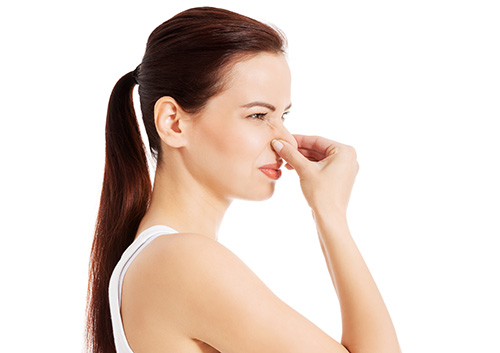April 24th, 2023

Halitosis is the fancy, scientific word for “bad breath.” Drs. Jay Corley and Rebecca Lauck and our team know there are several reasons why you may have halitosis; let’s look at a few:
- Gum disease (also known as periodontal disease) – There are five main types of gum disease, and each one can range from mild to severe. For example the most common one is gingivitis; it is caused by bacteria in the plaque that has been allowed to build up, usually as a result of poor oral hygiene. A more serious and uncommon type of gum disease is called necrotizing periodontal disease. It is most common in people who have a suppressed immune system.
- Smoking
- Dry Mouth – This can be caused by something as simple as a medication you take.
- Food – Of course, if you eat something that is potent like garlic, it is going to give you bad breath.
- Diseases of the Body – Some diseases such as sinus infections and diabetes, among a few other types of infections, can also cause you to have halitosis.
How to Get Rid of Halitosis
The most obvious answer to how to get rid of halitosis is to practice good oral hygiene, although, depending on the cause of halitosis it may not be that simple. If you have an infection that is causing the halitosis then you may need an antibiotic to clear up the infection and then the bad breath will go away. Here are more tips:
- Brush your teeth after every meal and before bed.
- Floss your teeth. The more plaque you get out of your teeth, the better chance you have of not getting cavities or bad breath.
- Address any medical conditions that are not related to your teeth that can be causing the halitosis.
- Ask Drs. Jay Corley and Rebecca Lauck for a prescription mouthwash that kills bacteria.
Halitosis (bad breath) can be an embarrassing condition to live with, but there are plenty of ways to get rid of it permanently. Start by talking to a member of our team at our Keller, TX office.
April 5th, 2023

Now that you’ve graduated from your braces or aligners, you might think you’re finished with orthodontic cleaning tips. Not quite yet! Your retainer needs love, too—not just because it can look or smell “less than appealing” without your help, but because it’s good for your dental health.
Removable Retainers
If you have a Hawley retainer or a clear retainer, cleaning it whenever you remove it is a great idea. Unappetizing white patches mean plaque or mineral deposits from your saliva have dried and hardened on your retainer’s surface. And if you notice an unpleasant taste or odor, it probably means that germs and bacteria have made themselves at home and are growing in and on your appliance.
You don’t want old plaque or new bacteria in your mouth! Here are some ways to keep your retainer clean and fresh:
- After wearing it, you can clean your retainer with a toothbrush, but don’t brush too vigorously. You might scratch it. Use a soft or even extra-soft brush to clean out all the nooks and crannies, and then rinse.
- Use cleaning products which have been recommended by Drs. Jay Corley and Rebecca Lauck if your retainer needs a deeper clean. Denture cleaners, retainer cleaners, and even toothpastes can be too abrasive or cause discoloration, so use the products made for your specific retainer.
- Let your retainer dry before storing it in a dry place after cleaning. Shutting a damp retainer into a closed case provides bacteria with the damp, dark environment they thrive in. (PS—clean your case regularly, too!)
- One of the benefits of a clear retainer is that it’s almost invisible. And you can help keep it that way by removing it whenever you eat or drink. Your retainer can become stained from colored foods or liquids.
Fixed Retainers
A permanent retainer is a small piece of wire that is custom-fit and bonded to the inside of selected teeth to keep them from shifting. Because food particles and plaque can accumulate around a fixed retainer, brushing after meals and at least twice a day is recommended. Bacteria and plaque cause bad breath, cavities, and tartar buildup, and removing tartar might require removing your retainer.
While a fixed retainer can be tricky to clean, there are techniques and products that make cleaning easier and more effective:
- An orthodontic toothbrush with a smaller head might reach behind your teeth more comfortably.
- Don’t forget to floss! Using a floss threader will help you get that wriggly floss behind the retainer and between your teeth.
- Try a water flosser. These handy devices direct a stream of water right into hard-to-reach places for more thorough cleaning.
If you’re having trouble keeping your retainer clean, our Keller, TX orthodontic team can teach you all you need to know about tools and techniques to keep your retainer—and your teeth and gums—healthy. An attractive smile is a great thing. A healthy, attractive smile is even better!
March 29th, 2023

You make sure your daughter wears her mouthguard to every soccer practice. Your son doesn’t step on the basketball court without his. Why not protect your smile as well?
Athletes of all ages in team or recreational sports can help prevent dental injuries with a protective mouthguard. If you bike or ski, play racquetball or squash, skate, or sky dive, a mouthguard will help keep your teeth and gums healthy as you keep fit.
Mouthguard Options
Our office will be happy to talk to you about whether a mouthguard is a practical addition to your workout gear. There are many options available to you, including:
Stock: Preformed appliances available at sporting goods stores and drugstores. These are the most affordable, but are a one-size-fits-all option and may not be a comfortable fit for you.
Boil-and-Bite: Also available at sports shops and drugstores. This guard is formed by placing it in hot water and then biting down to allow it to conform to the shape of your mouth.
Custom: Our Keller, TX office can create a personalized mouthguard just for you. Individual mouthguards are the most durable and comfortable option, in general, and provide the best fit for ease of talking and breathing while exercising. You may also have special dental conditions, such as the placement of crowns or braces, which could be a factor in your decision.
Whichever option you choose, remember to wear your mouthguard regularly while exercising. A proper mouthguard cannot only help prevent injuries to your teeth, but to your face and jaw as well. A healthy smile and a healthy body are a winning combination. The next time you visit Drs. Jay Corley and Rebecca Lauck, let’s talk sports!
March 29th, 2023

Drs. Jay Corley and Rebecca Lauck and our team hear this question a lot. Some of the common reasons for crooked teeth include:
- Thumb sucking
- Tongue thrusting or improper use of the tongue during speaking and swallowing
- Premature loss of baby teeth, which causes teeth to drift and shift
- Poor breathing airway caused by enlarged adenoids or tonsils
There are also hereditary factors we get from our parents, like:
- Extra teeth
- Large teeth
- Missing teeth
- Wide spaces between teeth
- Small jaws
Drs. Jay Corley and Rebecca Lauck and our team know that having crooked teeth isn’t just a cosmetic issue; it can lead to serious health problems as well. Crooked teeth can:
- Interfere with proper chewing
- Make keeping teeth clean more of a challenge, increasing the risk of tooth decay, cavities, and gingivitis
- Strain the teeth, jaws, and muscles, increasing the risk of breaking a tooth
There are several treatment options we offer at Blue Stone Dental that can help correct crooked teeth. Please give us a call at our convenient Keller, TX office to learn more or to schedule an initial consultation.





 Website Powered by Sesame 24-7™
Website Powered by Sesame 24-7™